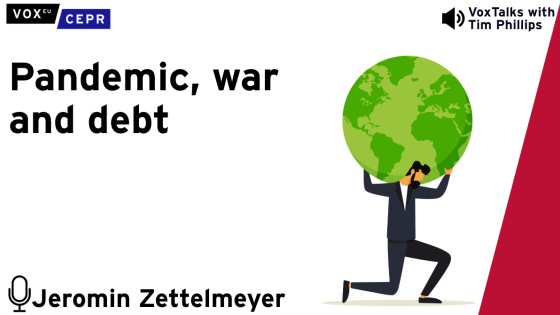Why do we care about business cycles? In 1985, Robert Lucas famously argued that the welfare cost of macroeconomic volatility is very small – and that economists should therefore focus on long-term growth rather than on stabilisation policies. He updated his calculations in 2003 using US data from 1947 to 2001 and arrived at the same conclusions – the cost of fluctuations from the long-term consumption trend amounts to just $30 per capita per year.
On the other hand, the costs of business cycles may not be limited to the volatility of current consumption. For example, those who cannot find a job during the recession suffer a negative shock to their human capital; this may have lasting implications for their productivity throughout their career (for example, Kahn 2010 finds a large, negative and persistent effect of graduating from college during a recession).
Another long-term cost of recession is its lasting impact on preferences and values that may in turn negatively affect economic and political decisions. For example, Giuliano and Spilimbergo (2014) show that Americans growing up in recessions are more likely to have pro-redistribution values than those who grow up in good times. Malmendier and Nagel (2007) show that individuals who have lived through better times in terms of stock market returns are less risk-averse.
The crisis in Russia and its effect on trust
In our recent paper (Ananyev and Guriev 2015), we find that the crises may also have an immediate, substantial, and lasting effect on interpersonal trust.1 Trust is one of the central concepts in the modern social science. It matters for political accountability (Nannicini et al. 2010), for the efficiency of the judiciary system (La Porta et al. 1997), for financial development (Guiso et al. 2004), and economic growth (Tabellini 2005, Algan and Cahuc 2010).
This is why it is important to understand what determines trust itself. Many researchers have argued that trust may have deep historical roots. For example, Putnam (1994) famously claimed that the differences in social capital (and, therefore, in the quality of governance) between northern and southern Italy can be explained by differences in political regimes dating back to the 11th century. Nunn and Wantchekon (2011) trace the low level of social capital in some African countries to the legacies of slave trade.
In our paper, we show that while it seems realistic to assume that the stock of social capital is path-dependent, it can also react to recent economic events. In particular, we study the effect of the economic crisis of 2008-09 on trust in Russia. In Russia, GDP declined by 8% from 2008 to 2009. The contraction was rapid. In the fourth quarter of 2008, GDP declined by 19% in annual terms, and in the first quarter of 2009, GDP declined by 17% in annual terms.
Russian regions varied in their experience of the crisis. In some of them, GDP went down by 20%, while in some others GDP actually went up by 1%. Why was the effect of crisis so different in different regions? The impact of the crisis depended on the regions’ industrial structure. The regions with a larger share of heavy industries and oil production experienced larger drops in income. As in any recession, investment suffered more than consumption. Figure 1 shows that in 2008-2009 investment declined by more than 50% while consumption decreased only by 6%. Not surprisingly, the producers of capital goods faced a dramatic fall in demand. And, as the global oil prices collapsed by a factor of three during the crisis, the oil and gas industry also declined by 40%. At the same time, consumer goods industries and services experienced only a moderate fall or even continued to grow.
Figure 1. Dynamics of different components of Russian GDP

Figure 2 shows that regions specialising in manufacturing experienced a greater GDP decline in 2009. On average, one percentage point increase in the share of manufacturing in the regional GDP was associated with an additional 0.4% fall in GDP during the crisis. The relationship between specialisation in oil and the impact of the crisis is similar.
Figure 2. The share of manufacturing in regional GDP and the impact of the crisis

The fall in GDP was accompanied by a large fall in interpersonal trust. In the regionally representative survey that we use in our paper, trust in Russia fell from 34% in the second quarter of 2008 to only 19% in 2009. The decrease in trust was, of course, larger in the regions with a greater fall in GDP. However, this correlation is not informative per se as the fall in GDP itself could have been endogenous to the decline in trust.
In order to resolve the endogeneity issue, we need to find an instrument for the GDP decline – a factor that would affect the fall in GDP during the crisis but would not affect the change in trust directly. We use the structure of the regional economy inherited from the Soviet times (namely, data from the last Soviet Industrial Census in 1989). Regions that specialised in oil or in capital goods production 25 years ago are still likely to continue to do so. Hence, they are likely to suffer the most during the crisis.
The variation in the composition of regional economies is inherited from Soviet industrialisation and is therefore exogenous to the events of 2008-09. We use the Soviet-era composition of the regional economy to predict the decline in income in 2009. We then use the predicted fall in income to measure the impact of regional income on trust. We find that the effect of change in income on change in trust is statistically significant and large in magnitude. Controlling for other conventional determinants of trust, we show that 10% decrease in income is associated with a five-percentage-point decrease in the share of respondents who say that most people can be trusted (Figure 3). For Russia, it is a large effect given that the average level of trust is 25%.
Figure 3. Change in trust and change in income between 2009 and 2009 in Russian regions.

Sources: Ananyev and Guriev (2015).
Is the destruction of social capital persistent? To answer this question, we included the question on trust in the survey conducted in the same regions in April 2014 using the same sampling strategy. By the beginning of 2014, Russian GDP was even higher than before the crisis. So, if the effect of income shocks on trust is transient, we should not find any evidence of the effect of the crisis’ on the change in trust between 2008 and 2014.
We found important differences in post-crisis dynamics of trust between the regions where the initial drop in trust had been low or moderate and the regions where the initial drop in trust had been high. In the first set of regions, trust rebounded to the pre-crisis levels. In the second set of regions, the level of trust was still 10 percentage points lower in 2014 than in 2008.
Concluding remarks
These findings suggest that economic recessions can indeed lead to a destruction of norms and beliefs that support cooperation. Our results have clear policy implications. Essentially, they provide an additional argument for the counter-cyclical government policies. The benefits of these policies are not limited to mitigating the short-term costs of recessions. The counter-cyclical policies can also contribute to the long-term development as they help sustain the stock of social capital.
References
Algan, Y, and P Cahuc (2010), “Inherited trust and growth”, The American Economic Review, 100(5), 2060-2092.
Ananyev, M, and S Guriev (2015), “Effect of Income on Trust: Evidence from the 2009 Crisis in Russia”, CEPR Discussion Paper 10354, Centre for Economic Policy Research, London.
Giuliano, P, and A Spilimbergo (2014), “Growing up in a recession”, Review of Economic Studies, 81 (2), 787-817.
Kahn, L (2010), “The long-term labor market consequences of graduating from college in a bad economy”, Labour Economics, 17(2), 303-316.
Lucas, R (1985), Models of Business Cycles, Yrjo Jahnsson Lectures, Oxford: Basil Blackwell.
Lucas, R (2003), “Macroeconomic Priorities”, The American Economic Review, 93(1): 1–14.
Malmendier, U, and S Nagel (2011), “Depression Babies: Do Macroeconomic Experiences Affect Risk-Taking”, Quarterly Journal of Economics, 126(1), 373-416.
Footnotes
1 The interpersonal trust (or ‘generalised social trust’) is the share of people that answer positively to the following survey question: “Generally speaking, would you say that most people can be trusted or that you can't be too careful in dealing with people?”






